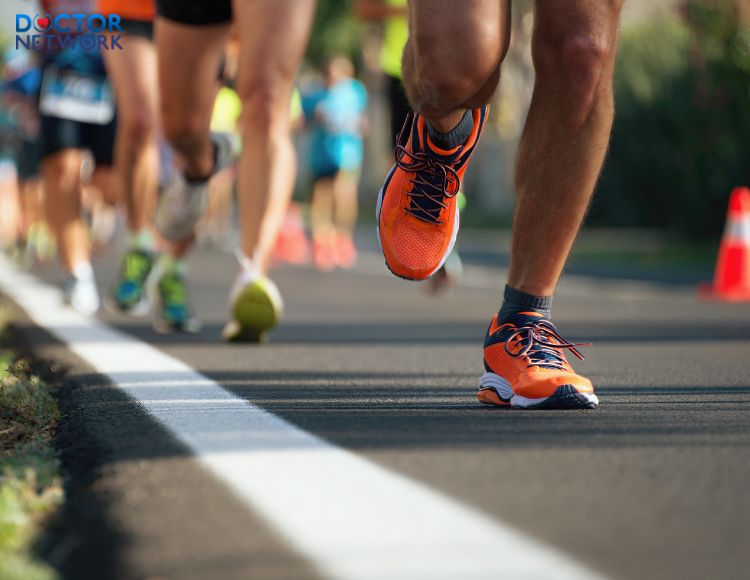Running (also known as jogging or marathon running) is one of the most effective cardio exercises for improving overall health. According to World Health Organization (WHO) research, maintaining regular running habits can reduce cardiovascular disease risk by 30% and increase average life expectancy by 3-5 years. This article provides detailed guidance on “recommended daily running duration,” proper technique, and practical advice from leading sports medicine experts.
Recommended Daily Running Duration by Target Group
| Target Group | Duration/Day | Frequency/Week | Intensity |
|---|---|---|---|
| Beginners | 15-20 minutes | 3-4 times | Light to moderate |
| Weight loss candidates | 30-45 minutes | 4-5 times | Moderate to high |
| Health maintenance | 30-60 minutes | 3-4 times | Moderate |
| Athletes | 60-90 minutes | 5-6 times | High |
Running is one of the most effective cardio exercises for improving overall health
Scientifically Proven Health Benefits
Cardiovascular and Metabolic Impact
- 40% reduction in stroke risk
- 25% increase in metabolic rate
- 30% improvement in cardiovascular health
| Body Component | Impact After 3 Months | Impact After 6 Months |
|---|---|---|
| Body fat | 5-8% reduction | 10-15% reduction |
| Cardiovascular endurance | 20% increase | 35% increase |
| Bone density | 3% increase | 5-7% increase |
Protocol for Beginners
- Weeks 1-2:
- 10 minutes brisk walking
- 5 minutes light jogging
- 5 minutes relaxed walking
- Weeks 3-4:
- 5 minutes brisk walking
- 15 minutes light jogging
- 5 minutes relaxed walking
Professional Running Technique
Detailed Technical Analysis
| Body Part | Standard Technique | Common Errors | Corrective Measures |
|---|---|---|---|
| Head and neck | Straight, looking 15-20m ahead | Head down, neck tilted | Maintain chin parallel to ground |
| Shoulders and arms | Relaxed, 90° elbow angle | Tense shoulders, excessive arm swing | Perform shoulder relaxation exercises pre-run |
| Upper body | Upright, 5-10° forward lean | Hunching, chest protruding | Strengthen core exercises |
You should do stretching exercises before jogging
Scientific Running Phases
- Warm-up Phase (10-15 minutes):
- 5 minutes brisk walking
- 3 minutes light jogging
- 2-7 minutes dynamic stretching
- Main Running Phase (As per Duration Table):
- Maintain steady breathing: 2 steps inhale, 2 steps exhale
- Monitor heart rate within safe zone
- Adjust pace according to perceived exertion
- Cool-down Phase (5-10 minutes):
- Gradual pace reduction
- Perform muscle stretching
- Light walking
Nutrition for Runners
Pre-Run Nutrition (2-3 hours prior)
| Timing | Food Type | Recommended Amount |
|---|---|---|
| 2-3 hours before | Complex carbohydrates | 200-300 kcal |
| 30 minutes before | Light fruit | 100-150 kcal |
| 15 minutes before | Water | 200-300ml |
Post-Run Nutrition (Within 30 minutes)
- High-quality protein: 20-25g
- Recovery carbohydrates: 30-40g
- Electrolytes and water: 500-750ml
Specialized Equipment and Attire
Quality Running Shoes
Selection Criteria:
- Foot shape compatibility
- Weight-appropriate cushioning
- Adequate ventilation
- Lightweight and flexible
Choose shoes with cushioning appropriate to your weight
Smart Apparel
Recommended Materials:
- Tops: Coolmax, Dri-fit, or moisture-wicking materials
- Bottoms: Spandex, stretch Polyester
- Socks: Anti-slip, moisture-wicking materials
Safety and Injury Prevention
Immediate Stop Indicators:
- Chest pain or dyspnea
- Dizziness, loss of balance
- Acute joint pain
Preventive Measures:
- Proper Warm-up:
- Complete all movements
- Progressive intensity increase
- Address all muscle groups
- Body Monitoring:
- Smart watch utilization
- Training log maintenance
- Body feedback adaptation
Additional Considerations
Morning vs. Evening Running
Morning (5:00 – 7:00):
- Recommended duration: 20-30 minutes
- Enhanced metabolic rate throughout day
- Clean air, minimal pollution
- Improved cognitive function and productivity
Evening (17:00 – 18:30):
- Recommended duration: 30-45 minutes
- Natural body warm-up state
- Stress reduction post-work
- Enhanced sleep quality
Fat Burning Optimization
According to American Heart Association (AHA) and National Institute of Nutrition:
- Optimal duration: 45-60 minutes/day
- Frequency: 4-5 times/week
- Intensity: Moderate to high (65-75% max heart rate)
- Energy expenditure: 400-600 kcal/session
- Results timeline: 4-6 weeks with appropriate diet
Hydration Protocol
WHO and Sports Medicine Association Guidelines:
Pre-run:
- 400-600ml water (2-3 hours before)
- 200-300ml water (15 minutes before)
During run:
- 150-200ml/15-20 minutes of running
- Small sips
- Electrolyte replacement for sessions >45 minutes
Post-run:
- 500-750ml within 2 hours
- Electrolyte replacement for heavy perspiration
Frequently Asked Questions About “Recommended Daily Running Duration”
Morning vs. Evening Running: Which is Better and How Long Should You Run?
Both time periods offer distinct physiological advantages:
Morning Running (5:00 – 7:00):
- Recommended duration: 20-30 minutes
- Enhanced metabolic rate throughout the day
- Optimal air quality, minimal pollutants
- Improved cognitive function and work productivity
Evening Running (17:00 – 18:30):
- Recommended duration: 30-45 minutes
- Natural physiological preparedness
- Post-work stress reduction
- Enhanced sleep quality parameters
Optimal Duration for Abdominal Fat Reduction
According to research from the American Heart Association (AHA) and National Institute of Nutrition:
- Optimal duration: 45-60 minutes/day
- Frequency: 4-5 sessions/week
- Intensity: Moderate to high (65-75% maximum heart rate)
- Energy expenditure: 400-600 kcal/session
- Results timeline: 4-6 weeks with appropriate dietary intervention
Running Frequency Recommendations for Beginners
Initial Week Protocol:
- 3 sessions/week
- 15-20 minutes/session
- Alternating walking and light jogging intervals
Progressive 10% Increment Protocol:
- Weeks 2-3: 20-25 minutes/session
- Weeks 4-5: 25-30 minutes/session
- Post 6 weeks: Capability for 30-40 minutes/session
Hydration Protocol for Runners
According to World Health Organization (WHO) and Sports Medicine Association guidelines:
Pre-Run Hydration:
- 400-600ml water (2-3 hours prior)
- 200-300ml water (15 minutes prior)
During Exercise:
- 150-200ml/15-20 minutes of running
- Small-volume sips
- Electrolyte supplementation for sessions exceeding 45 minutes
Post-Exercise Recovery:
- 500-750ml within initial 2 hours
- Electrolyte replacement for significant perspiration
Fat Oxidation Timeline During Running
Based on Harvard Sports Research Center studies:
Initial Fat Oxidation Phase:
- Commences after 15-20 minutes of continuous running
- Target heart rate: 65-75% of maximum
- Initial glycogen depletion phase
Optimal Fat Oxidation Duration:
- 30-45 minutes continuous running
- Steady-state heart rate maintenance
- Exercise within fat-burning zone
Target Heart Rate Calculation:
Optimal heart rate = (220 – Age) × 70%
Clinical Advisory: These recommendations represent general guidelines that require individualization based on physical condition and therapeutic objectives. Medical consultation is strongly advised before initiating any running program, particularly for individuals with pre-existing health conditions.
Scientific Evidence
Longevity and Running Duration Study
Study: “Leisure-Time Running Reduces All-Cause and Cardiovascular Mortality Risk”
- Institution: Cooper Institute of Public Health, Dallas, Texas
- Publication year: 2014
- Journal: Journal of the American College of Cardiology
- Key finding: 50 minutes/week running reduces early mortality risk by 30% and cardiovascular disease by 45%
- Participants: 55,137
- Follow-up period: 15 years
Optimal Running Duration Study
Study: “Association of Running Duration and Cardiovascular Health”
- Institution: Harvard Medical School
- Publication year: 2019
- Journal: JAMA Internal Medicine
- Key finding: 30-45 minutes daily running provides optimal health benefits
- Participants: 116,221
- Follow-up period: 12 years
Conclusion
Recommended Daily Running Duration is crucial for achieving individual health objectives. Following these evidence-based guidelines, combined with proper nutrition and equipment, will establish sustainable and safe running habits.
Kiểm Duyệt Nội Dung
More than 10 years of marketing communications experience in the medical and health field.
Successfully deployed marketing communication activities, content development and social networking channels for hospital partners, clinics, doctors and medical professionals across the country.
More than 6 years of experience in organizing and producing leading prestigious medical programs in Vietnam, in collaboration with Ho Chi Minh City Television (HTV). Typical programs include Nhật Ký Blouse Trắng, Bác Sĩ Nói Gì, Alo Bác Sĩ Nghe, Nhật Ký Hạnh Phúc, Vui Khỏe Cùng Con, Bác Sỹ Mẹ, v.v.
Comprehensive cooperation with hundreds of hospitals and clinics, thousands of doctors and medical experts to join hands in building a medical content and service platform on the Doctor Network application.





























